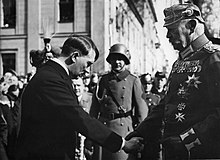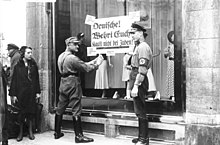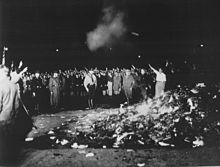1933 in Germany
| |||||
| Decades: |
| ||||
|---|---|---|---|---|---|
| See also: | Other events of 1933 History of Germany • Timeline • Years | ||||

27 February - Reichstag fire: Germany's parliament building in Berlin, the Reichstag, is set on fire.
Events in the year 1933 in Germany.
Incumbents[]
National level[]
- President: Paul von Hindenburg
- Chancellor:
- Kurt von Schleicher (until 28 January 1933)
- Adolf Hitler (from 30 January 1933)
Events In Germany[]

21 March: President Paul von Hindenburg meets Hitler on "Day of Potsdam"
- 30 January – Nazi leader Adolf Hitler is appointed Chancellor of Germany by President of Germany Paul von Hindenburg.
- 1 February – Adolf Hitler gives his "Proclamation to the German People" in Berlin.
- 27 February – The Reichstag, Germany's parliament building in Berlin, is set on fire under controversial circumstances.
- 28 February – The Reichstag Fire Decree is passed in response to the Reichstag fire, nullifying many German civil liberties.
- 1 March – Hundreds are arrested as the Nazis round up their political opponents.
- 5 March – German federal election, March 1933: National Socialists gain 43.9% of the votes.
- 8 March – Nazis occupy the Bavarian State Parliament and expel deputies.
- 12 March – Hindenburg bans the flag of the republic and orders the Imperial and Nazi flag to fly side by side.
- 15 March – Hitler proclaims the Third Reich.
- 20 March – Dachau, the first Nazi concentration camp, is completed (it opens 22 March).
- 21 March – Jewish organizations announce an economic boycott of German goods.
- 23 March – The Reichstag passes the Enabling Act ("The law for removing the distress of people and the Reich"), making Adolf Hitler dictator of Germany, curbing its own power.[1]
- 26 March – Air minister Hermann Göring denies that Germany's Jews are in danger.

1 April: Nazi soldiers hang a poster on the window of Jewish-owned business, that says: "German, protect yourself. Do not buy from Jews".
- 1 April – The recently elected Nazis under Julius Streicher organise a one-day boycott of all Jewish-owned businesses in Germany.
- 7 April – The Law for the Restoration of the Professional Civil Service is passed, forcing all "non-Aryans" to retire from the legal profession and civil service.[1]
- 21 April – Germany outlaws the kosher ritual shechita.
- 26 April – The Gestapo is established in Germany.
- 27 April – Der Stahlhelm veterans organisation joins the Nazi Party.

10 May: In Germany, the Nazis stage massive public book burnings.
- 10 May – Nazi book burnings are staged publicly throughout Germany.
- 26 May – The Nazi Party introduces a law to legalise eugenic sterilisation.
- 2 June – The Nazi authorities form the 'Expert Committee on Questions of Population and Racial Policy' under Reich Interior Minister Wilhelm Frick.
- 21 June – All non-Nazi political parties are forbidden.[1]
- 25 June – The Wilmersdorfer Tennishallen delegates convene in Berlin to protest against the persecution of Jehovah's Witnesses in Nazi Germany.
- 14 July – Forming new political parties is forbidden.[1] The Law for the Prevention of Hereditarily Diseased Offspring is implemented.
- 20 July – Signing of the Reichskonkordat between the Vatican and Nazi Germany.
- 23 August – The Nazis publish the first of the four lists of people whose German citizenship, passports and other privileges are withdrawn. On the first list of thirty-three names are the Jewish authors Heinrich Mann, Lion Feuchtwanger, Ernst Toller and Kurt Tucholsky.
- 30 August–3 September – The 5th Nazi Party Congress is held in Nuremberg and is called the "Rally of Victory" (Reichsparteitag des Sieges) in reference to the Nazi seizure of power[2]
- 16 October – Germany officially announces its intention to leave the League of Nations.
Births[]
This section needs expansion. You can help by . (April 2011) |
- 20 March — Michael Pfleghar, German film director and screenwriter (d. 1991)
- 15 May — Ursula Schleicher, German politician and harpist
- 29 May — Helmuth Rilling, German choral conductor
- 8 June — Ernst W. Hamburger, German-born Brazilian physicist (d. 2018)
- 5 July — Michael Heltau, German actor and singer
- 10 September — Karl Lagerfeld, German fashion designer (d. 2019)
- 23 October — Yigal Tumarkin, German-born Israeli painter and sculptor
Deaths[]
- 3 January — Wilhelm Cuno, German politician and former Chancellor of Germany (born 1876)
- 14 February – Carl Correns, German botanist and geneticist (born 1864)
- 7 September — Max Adalbert, German actor (born 1874)
- 11 October — Reinhold Tiling, German engineer (born 1893)
References[]
- ^ a b c d McDonough, Frank (February 2020). "1933: death of a democracy". History Today. 70 (2): 70-83.
- ^ Spiegel.de (German)
Categories:
- 1933 in Germany
- Years of the 20th century in Germany
- 1933 in Europe
- 1933 by country